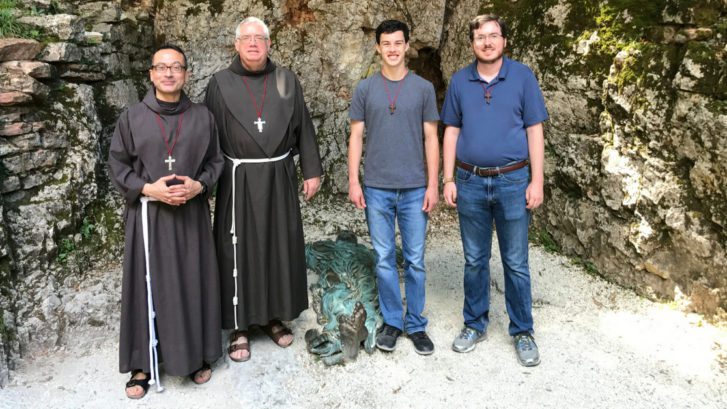The following reflection is from George Nemanich (second from right), a participant in the Franciscan At-One-Ment Mission Project—a summer discernment internship which includes living with the Friars while studying in Rome about “Ecumenical and Interreligious Movements from a Catholic Perspective.”
“Lord Jesus Christ, who said to your Apostles: Peace I leave you, my peace I give you, look not on our sins, but on the faith of your Church, and graciously grant her peace and unity in accordance with your will.“
Today our class met with both the Pontifical Council for the Promotion of Christian Unity and the Pontifical Council for Interreligious Dialogue. It was an incredible experience to see both of these great institutions. It gave me a chance to see the Vatican at work. During both sessions we had a chance to ask the representative of the respective council questions, so for the Council for the Promotion of Christian Unity, I asked a question I had been wondering regarding the Orthodox Church in Ukraine. The official Orthodox Church of the country, as recognized by the Vatican, is the Moscow Patriarchate which is a descendant of the Medieval patriarchate of Kyiv. Many Ukrainians, however, want to establish a patriarchy in Kyiv and see it as the sole legitimate continuation of the old patriarchate in Kyiv. The claims stem from Muscovite corruption in the moving of the patriarchate, as well as the current ties to Vladimir Putin, who is understandably vilified in Ukraine. Because the anti-Moscow sentiments are shared by both the majority of Orthodox Christians and of Greek Catholics in Ukraine (at least in my experience with the two groups), I asked Bishop Farrell (the representative and secretary of the council) what could be done to ease the tension around the creation of a new Kyiv Patriarchate when it seems that the only opposition is coming from Moscow.
His answer centered around how Pope Francis’ efforts to reconcile with the Orthodox Churches, on the whole, made it important for the Catholic Church to take sides in the Kyiv-Moscow controversy. This disappointed me. The Moscow Patriarchate is notoriously corrupt and is standing behind (in some ways propping up) an immoral dictator in Putin, who not only threatens his own people, but also innocent people of neighboring countries. To support attempts at a Kyiv Patriarchate is to forget our responsibility to be in solidarity with the Ukrainian people who are marginalized by the Putin regime that the Moscow Patriarchy supports.
But then I took a step back. Standing in a building built on the land donated to the Church by a very corrupt and immoral man in Constantine the Great, it made me realize that even the holiest and benevolent Church can on occasion succumb to political pressures. It is important to not let political mistakes of Churches dictate our theological standing with them; this was what caused the division with Orthodox Churches to begin with. Rather, we should approach the situation with the humility that Pope Francis has so often exemplified, offering our encouragement and support for progress away from the corrupt practices that have tainted and continue to taint the Moscow Patriarchy. At the same time, we should offer consolation for Ukrainian Orthodox Christians who have faced the grave misfortune of the situation through the Ukrainian Catholic Church—a Church that has been very active in its support for marginalized people in Ukraine. Let us reach out to the Moscow Patriarchy instead of giving up on it. In the words of the prayer of peace said in Mass “look not on our sins, but on the faith of your Church, and graciously grant her peace and unity in accordance with your will.“ The common faith of the Churches should be what tells us to overcome our political divisions


Where in the bible does it say “Look not on our sins but on the faith of your church”?